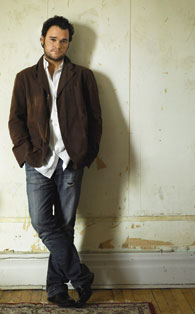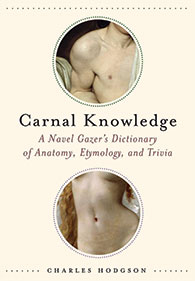Newsbites (Page 3)
No Two Solitudes Here

Montreal-based singer-songwriter Thomas Hellman, BA'98, MA'04, is part of a rare breed — musicians who create and perform well-crafted songs in both English and French. It's unusual, even in a bilingual pop music mecca like Montreal, where bands with followings among both anglophones and francophones tend to specialize in either English (Arcade Fire) or French (Malajube).
"The two languages are like different instruments to me," says Hellman. Departure Songs, a CD collection of some of Hellman's work in English, was released this spring, while L'appartement, his most recent French album, was made available in France in May.
"I don't feel like I have a mother tongue," he says, explaining that his father, John Hellman, a McGill history professor, is from Texas, while his mother is a teacher from the south of France.
Music critics from both sides of the language divide hail Hellman's music, making favourable comparisons to the likes of Leonard Cohen and Tom Waits. And after recently winning the Prix Félix-Leclerc songwriting award in Quebec, as well as the Prix des Coups de Coeur de L'Académie Charles Cross award for emerging artists in France, his star continues to rise.
Hellman's music career might seem far removed from his graduate work in French literature at McGill, but he believes his studies have informed his art.
Hellman focused on the French writing of Samuel Beckett, who wrote in both English and French, and on the issues of language and identity that it raises. "The bilingualism of Beckett's oeuvre was an essential part of my reflections on identity," he says. "It made me realize that people tend to be more comfortable with simplified understandings of identity.
An identity that is fragmentary is more interesting than something more obvious. That's had an impact on my writing."
Body Language

If someone calls you Callipygian and you are not sure what to think, you may need a copy of Carnal Knowledge: A Navel Gazer's Dictionary of Anatomy, Etymology, and Trivia. You will find the term means "having beautiful buttocks" and can act accordingly. Be flattered that you have been compared to Venus, the goddess of love and beauty, whose rear end inspired the word, or smack the villain in his buccal cavity (aiming for the mouth).
Charles Hodgson, BEng'81, is a dedicated logophile and has compiled the origins, meanings and uses of hundreds of anatomical words and phrases in Carnal Knowledge.
Did you know that the word "sideburns" had its origins in the shaving habits of 19th-century U.S. senator Ambrose Everett Burnside? That there is no word in English for that bony bump on the outside of your wrist, referred to by acupuncturists as the "yanglao"?
Hodgson has had careers in engineering and technology management, worked on environmental issues and participated in the dot-com bubble, getting out just before it burst, which is when he started writing full-time.
"Words and wordplay have always been an interest of mine," he says. "Every time I come across some new twist in how a word has developed, I feel it gives me a little more insight into human nature and history."
Hodgson has developed a daily podcast about the extraordinary origins of ordinary words, called Podictionary, which has now had three million downloads and been written up in publications like USA Today and Jane magazine.
While working on Carnal Knowledge, Hodgson consulted Dr. Dennis Osmond, McGill's Robert Reford Emeritus Professor of Anatomy, for expert advice. "I'm like many authors in that I'd like to have my errors pointed out to me before publication," he says, "and so I sought out several people who might gently tell me where I'd gone wrong. Professor Osmond was very supportive."
Visit www.podictionary.com for more information.


